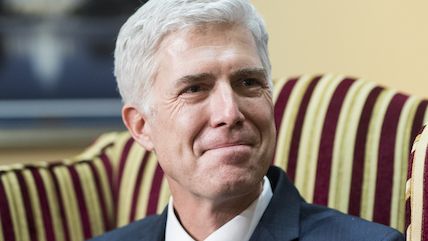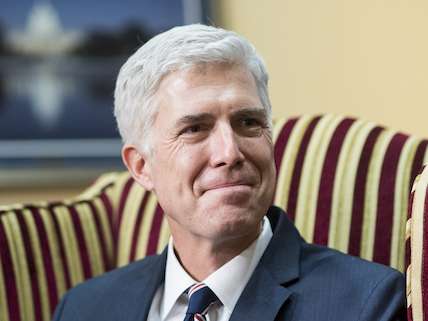Read Neil Gorsuch's Epic Dissent in a Case Where a 13-Year-Old Was Arrested for Burping in School
Trump's Supreme Court pick isn't a fan of stupid teen arrests.


Neil Gorsuch, President Trump's pick to replace the late Associate Justice Antonin Scalia on the Supreme Court, once dissented in a ridiculous 10th Circuit Court of Appeals case that involved the arrest of a 13-year-old for burping in school.
The majority upheld the school's decision to call the cops and have the teenager arrested for making fake burping noises while in gym class. Gorsuch, however, was not persuaded that the law permitted the state to intervene in such a trivial disciplinary matter.
The case was A.M. v. Holmes. According to The Washington Post's summary of the case, a seventh grader "generated several fake burps, which made the other students laugh and hampered class proceedings." The gym teacher called the school resource officer, who then arrested the teen. The teen's mother sued the officer and school officials on grounds that her son had been unlawfully arrested. The court sided with the school, but Gorsuch dissented:
If a seventh grader starts trading fake burps for laughs in gym class, what's a teacher to do? Order extra laps? Detention? A trip to the principal's office? Maybe. But then again, maybe that's too old school. Maybe today you call a police officer. And maybe today the officer decides that, instead of just escorting the now compliant thirteen year old to the principal's office, an arrest would be a better idea. So out come the handcuffs and off goes the child to juvenile detention. My colleagues suggest the law permits exactly this option and they offer ninety-four pages explaining why they think that's so. Respectfully, I remain unpersuaded…
Often enough the law can be "a ass — a idiot," Charles Dickens, Oliver Twist 520 (Dodd, Mead & Co. 1941) (1838) — and there is little we judges can do about it, for it is (or should be) emphatically our job to apply, not rewrite, the law enacted by the people's representatives. Indeed, a judge who likes every result he reaches is very likely a bad judge, reaching for results he prefers rather than those the law compels. So it is I admire my colleagues today, for no doubt they reach a result they dislike but believe the law demands — and in that I see the best of our profession and much to admire. It's only that, in this particular case, I don't believe the law happens to be quite as much of a ass [sic] as they do. I respectfully dissent.
Over-criminalization of inappropriate kid behavior in K-12 schools is actually a huge national problem, as Tyler Kotesky and I pointed out in our recent feature for the print edition of Reason magazine, "Why Are Cops Putting Kids in Cuffs?" Over the past several decades schools have increasingly hired school resource officers to enforce discipline, which has resulted in more and more misbehaving teens being sent to jail instead of the principal's office. This is a problem, because kids are much less likely to finish school, go to college, and become productive members of society after exposure to the criminal justice system.
It's a problem mostly in need of legislative solutions, so Gorsuch's inclusion on the Supreme Court probably won't make much of a difference. But it's encouraging to know that if a school zero tolerance case came before the Court, Gorsuch would be more likely to defend teenagers' rights and push back against creeping criminalization of normal kid behavior.
For more on Gorsuch, watch Reason TV's interview with Georgetown University Law Professor Randy Barnett.


Show Comments (76)